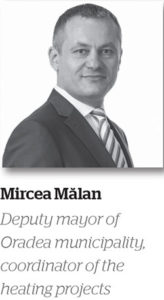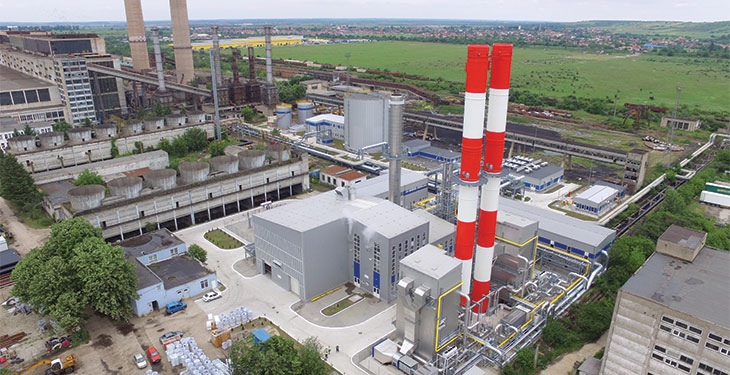Oradea City Hall shall continue this year the project for the rehabilitation of the heating network by replacing 23 kilometers of networks and modernizing the thermal points, project for which approximatively EUR 32 million were allocated. The initiative continues ample actions prior to modernizing the centralized heating system in Oradea. We talked with deputy mayor Mircea Mălan in order to find out details about the way of functioning and administration of the city’s heating network.
Esteemed mister Mircea Mălan, please describe in a few words the centralized heating system in Oradea, with emphasis on the organization of thermal energy production and distribution services.
 The Oradea Heating Company SA was founded in 2013, having as shareholders Oradea Municipality 99.999% and Sinmartin Commune 0.0001% and its object of activity is the production of electricity and heat in co-generation, the transmission, distribution and supply of heat within a centralized system in Oradea Municipality and Sinmartin commune.
The Oradea Heating Company SA was founded in 2013, having as shareholders Oradea Municipality 99.999% and Sinmartin Commune 0.0001% and its object of activity is the production of electricity and heat in co-generation, the transmission, distribution and supply of heat within a centralized system in Oradea Municipality and Sinmartin commune.
Currently, the centralized system has two main components. On the one hand, we have the production capacities, formed by a gas turbine from General Electric, with an installed power of 45 MW electric and 53 MW thermal, through the recovery boiler (EKOL, Czech Republic), two hot water boilers (EKOL, Czech Republic), a heat cell with a capacity of 9,500 cubic meters and the geo-thermal water installation (6% of the total production).
The second component is formed by the transmission network, measuring 86.2 kilometers of main pipeline, 147 thermal points, 790 thermal modules found under consumer private property an 142.5 km of secondary networks.
Oradea municipality has succeeded over the last years to materialize large modernization programs, including by attracting European funding. How did you do it?
Between 2008-2010, as a result of certain studies and analyses, we reached the conclusion that maintaining the centralized thermal energy supply system and modernizing it represents the optimal and efficient solution for heating households in the Oradea municipality. In this context, we elaborated a multiannual program for the rehabilitation of the centralized heating system. Given the large amounts necessary for its rehabilitation, we tried to fund major investments through European funding, governmental funding or international grants.
As such, starting with 2013, Oradea City Hall has made the largest investments within a centralized heating system in Romania, of EUR 112 million without VAT. Of these, EUR 94 million came through European funding projects, EUR 6 million from projects with governmental co-funding, EUR 4 million through attracting certain international grants and EUR 8 million from the local budget.
How did you collaborate with the private environment and how did you attract and use the companies’ expertise (products and equipment suppliers, manufacturers etc.)?
For establishing the solutions for modernizing the centralized heating system, we analyzed models from Germany, Austria and Denmark, where companies managing these installations function efficiently and in a profitable manner. In Romania, we collaborated with the largest companies in the field.
How did the investments you made transfer into the comfort of the final beneficiaries?
The investments had as result the significant improvement of the service quality. Due to the advanced state of degradation, the centralized system needed to be urgently rehabilitated as to guarantee the safety of supply of the thermal agent to the 70% of city inhabitants who use this system. Just to give you a few examples of the improvement of services, the number of serious fault conditions, identified on the primary networks decreased from 200 in 2014 to 22 in 2017. The energy losses were 18.7% lower in 2017 than in 2014.
Concurrently, Oradea is the only city in Romania where the number of clients connected to the centralized heating system has increased constantly over the last four years. In 2014-2017, approximatively 1,200 apartments, 3 schools, 2 churches and 210 individual households were connected to the centralized heating system. Furthermore, once passing from the old furnace, which functioned on coal, to the new furnace, on gas, the CO2 emissions decreased three times.
How are these efforts perceived within the City Hall budget (the level of subsidy, expenses allocated to the good functioning of the centralized heating system)?
Oradea has the smallest subsidy in the country, RON 49 per gigacalory, compared to Cluj-Napoca, where it is RON 190, Timisoara, RON 121 and Bucharest, RON 193. Wth the 18.7% decrease in losses in the thermal energy transmission and distribution system, the exploitation subsidy decreased.
Concurrently, maintenance expenses for the transmission and distribution network have significantly decreased (including interventions in fault conditions), which allowed the Oradea City Hall to continue to allocate large amounts of money from the state budget for the co-funding and funding of investments in the heating system. At the moment, work is conducted for drafting the documentation needed for the second stage of the Operational Program Large Investments (POIM), with an estimated investment value of approximately EUR 27 million, without VAT. Moreover, projects worth EUR 2 million shall be realized by accessing the Heat and Comfort program for the year 2018, and from the local budget we intend to invest approximately EUR 3.5 million.
—————————————-
This interview firstly appeared in the printed edition of energynomics.ro Magazine, issued in March 2018.
In order to receive this issue of energynomics.ro Magazine, we encourage you to write us at office [at] energynomics.ro to include you in our distribution list. All previous editions are available HERE.
